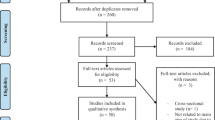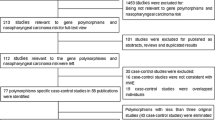Abstract
Previous evidence has indicated that the polymorphism of tumor necrosis factor-alpha (TNF-α) is a risk factor for various cancers, however, the association between TNF-α-308G/A polymorphism and nasopharyngeal carcinoma (NPC) remains controversial and ambiguous. The aim of this study is to clarify the association between TNF-α polymorphism and NPC using meta-analysis. A meta-analysis based on five eligible case–control studies involving 499 cases and 1,470 controls was carried out to summarize the data on the association between TNF-α-308G/A polymorphism and NPC risk. Odds ratios (OR) with 95 % confidence intervals (95 % CI) were used to assess the strength of this association in the fixed-effect model. The pooled analyses showed no significant association between TNF-α-308G/A polymorphism and NPC (AA vs. GG: OR = 1.38, P = 0.193; GA vs. GG: OR = 0.92, P = 0.585; GA + AA vs. GG: OR = 1.00, P = 0.972; AA vs. GA + GG: OR = 1.44, P = 0.138). We also categorized by geographic location (non-Asian or Asian) for subgroup analysis; the results also showed no significant association between TNF-α-308G/A polymorphism and NPC risk in all of the comparisons. No publication bias was observed in this study (t = −0.11, P = 0.918, 95 % CI = −4.893–4.559). No significant association was found between TNF-α-308G/A polymorphism and the risk for NPC.


Similar content being viewed by others
References
Yu MC, Yuan JM (2002) Epidemiology of nasopharyngeal carcinoma. Semin Cancer Biol 12:421–429
Chan TC, Teo ML, Johnson J (2002) Nasopharyngeal carcinoma. Ann Oncol 13:1007–1015
Cheng YJ, Hildesheim A, Hsu MM et al (1999) Cigarette smoking, alcohol consumption and risk of nasopharyngeal carcinoma in Taiwan. Cancer Causes Control 10:201–207
Chang ET, Adami HO (2006) The enigmatic epidemiology of nasopharyngeal carcinoma. Cancer Epidemiol Biomarkers Prev 15:1765–1777
Shao JY, Wang HY, Huang XM et al (2000) Genome-wide allelotype analysis of sporadic primary nasopharyngeal carcinoma from southern China. Int J Oncol 17:1267–1275
Hildesheim A, Apple RJ, Chen CJ et al (2002) Association of HLA class I and II alleles and extended haplotypes with nasopharyngeal carcinoma in Taiwan. J Natl Cancer Inst 94:1780–1789
Cao Y, Miao XP, Huang MY et al (2006) Polymorphisms of XRCC1 genes and risk of nasopharyngeal carcinoma in the Cantonese population. BMC Cancer 6:167
Tiwawech D, Srivatanakul P, Karalak A et al (2006) Cytochrome P450 2A6 polymorphism in nasopharyngeal carcinoma. Cancer Lett 241:135–141
Guo X, O’Brien SJ, Zeng Y et al (2008) GSTM1 and GSTT1 gene deletions and the risk for nasopharyngeal carcinoma in Han Chinese. Cancer Epidemiol Biomarkers Prev 17:1760–1763
Bei JX, Li Y, Jia WH et al (2010) Agenome-wide association study of nasopharyngeal carcinoma identifies three new susceptibility loci. Nat Genet 42:599–603
Wilson AG, di Gioine FS, Blakemore AI et al (1992) Single base polymorphism in the human tumor necrosis factor α (TNFα) gene detected by NcoI restriction of PCR product. Hum Mol Genet 5:353
Sousa H, Breda E, Santos AM et al (2011) Genetic risk markers for nasopharyngeal carcinoma in Portugal: tumor necrosis factor alpha -308G>A polymorphism. DNA Cell Biol 30:99–103
Zhang BL, Liang WB, Ran P et al (2007) Gene polymorphisms of tumor necrosis factor and the susceptibility to nasopharyngeal carcinoma in Han population in Southwest China. J Clin Rehabil Tissue Eng Res 11:6819–6822
Ho SY, Wang YJ, Huang PC et al (2006) Evaluation of the associations between the single nucleotide polymorphisms of the promoter region of the tumor necrosis factor-alpha gene and nasopharyngeal carcinoma. J Chin Med Assoc 69:351–357
Tsai MH, Chen WC, Tsai FJ (2002) Correlation of p21 gene codon 31 polymorphism and TNF-alpha gene polymorphism with nasopharyngeal carcinoma. J Clin Lab Anal 16:146–150
Jalbout M, Bouaouina N, Gargouri J et al (2003) Polymorphism of the stress protein HSP70-2 gene is associated with the susceptibility to the nasopharyngeal carcinoma. Cancer Lett 193:75–81
Young LS, Rickinson AB (2004) Epstein-Barr virus: 40 years on. Nat Rev Cancer 4:757–768
Zeng YX, Jia WH (2002) Familial nasopharyngeal carcinoma. Semin Cancer Biol 12:443–450
Jia WH, Collins A, Zeng YX et al (2005) Complex segregation analysis of nasopharyngeal carcinoma in Guangdong, China: evidence for a multifactorial mode of inheritance (complex segregation analysis of NPC in China). Eur J Hum Genet 13:248–252
Wu MS, Huang SP, Chang YT et al (2002) Tumor necrosis factor-alpha and interleukin-10 promoter polymorphisms in Epstein-Barr virus-associated gastric carcinoma. J Infect Dis 185:106–109
Chouchane L, Ben Ahmed S, Baccouche S et al (1997) Poly-morphism in tumor necrosis factor- promoter region and in the heat shock protein 70 genes associated with malignant tumors. Cancer 80:1489–1496
Oh BR, Sasaki M, Perinchery G et al (2000) Frequent genotype changes at −308 and 488 regions of the tumor necrosis factor-α (TNF-α) gene in patients with prostate cancer. J Urol 163:1584–1587
Jang WH, Yang YI, Yea SS et al (2001) The −238 tumor necrosis factor-α promoter polymorphism is associated with decreased susceptibility to cancers. Cancer Lett 166:41–46
Ho SY, Wang YJ, Chen HL et al (2004) Increased risk of developing hepatocellular carcinoma associated with carriage of the TNF2 allele of the −308 tumor necrosis factor-α promoter gene. Cancer Causes Control 15:657–663
Kroeger KM, Carville KS, Abraham LJ (1997) The −308 tumor necrosis factor-α promoter polymorphism effects transcription. Mol Immunol 34:391–399
Wilson AG, de Vaies N, Paciot F et al (1993) An allelic polymorphism within the human HLA-A1, B8, and DR3 alleles. J Exp Med 177:557–560
Shen C, Sun H, Sun D et al (2011) Polymorphisms of tumor necrosis factor-alpha and breast cancer risk: a meta-analysis. Breast Cancer Res Treat 126:763–770
Lu PH, Tang Y, Li C et al (2010) Meta-analysis of association of tumor necrosis factor alpha-308 gene promoter polymorphism with gastric cancer. Zhong hua Yu Fang Yi Xue Za Zhi 44:209–214
Yang Y, Luo C, Feng R et al (2010) The TNF-alpha, IL-1B and IL-10 polymorphisms and risk for hepatocellular carcinoma: a meta-analysis. J Cancer Res Clin Oncol 137:947–952
Acknowledgments
All of the authors are grateful to Professor Zhi-ping Chen for his constructive criticism on an earlier draft of this manuscript, and for the integrity of the data and the accuracy of the data analysis.
Conflict of interest
No competing financial interests exist.
Author information
Authors and Affiliations
Corresponding authors
Additional information
L. Xie and X.-N. Liang contributed equally to this work.
Rights and permissions
About this article
Cite this article
Xie, L., Liang, XN., Deng, Y. et al. TNF-α-308G/A polymorphisms and nasopharyngeal cancer risk: a meta-analysis. Eur Arch Otorhinolaryngol 270, 1667–1672 (2013). https://doi.org/10.1007/s00405-012-2276-0
Received:
Accepted:
Published:
Issue Date:
DOI: https://doi.org/10.1007/s00405-012-2276-0




